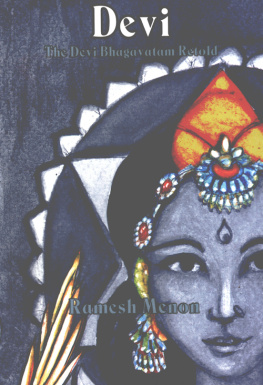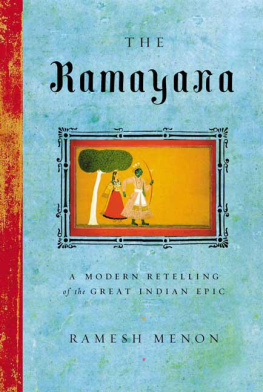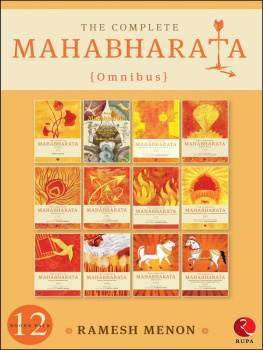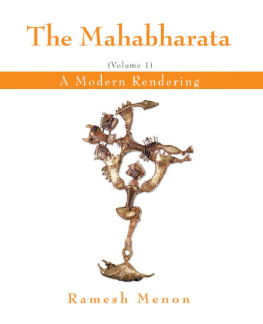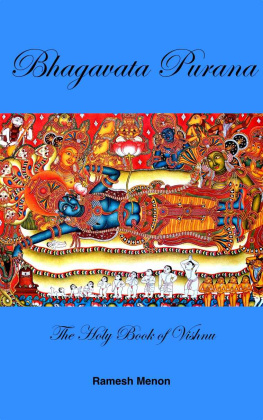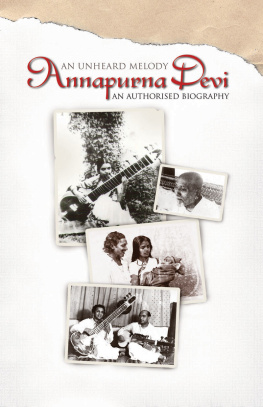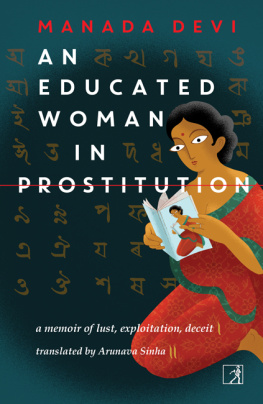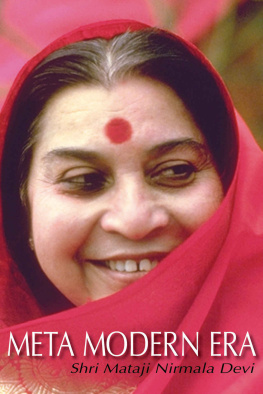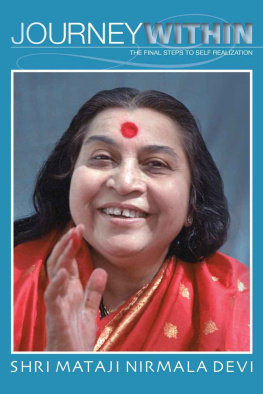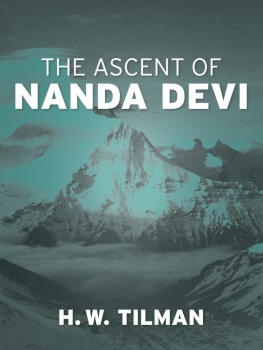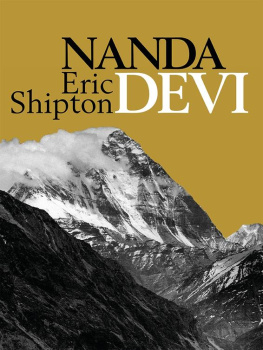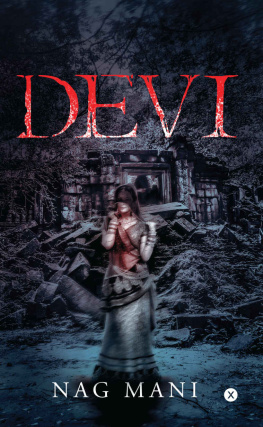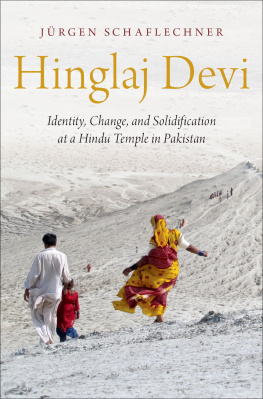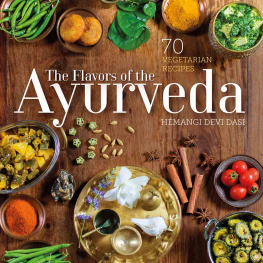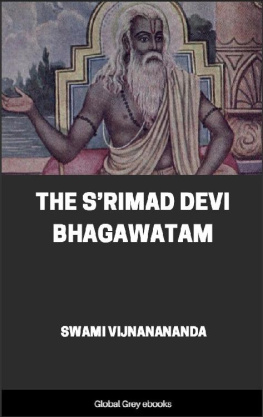DEVI
Copyright Ramesh Menon 2006
First Published 2006
Fifth Impression 2011
Published by
Rupa Pubtications India Pvt. Ltd.
7/16, Ansari Road, Daryaganj,
New Delhi 110 002
Sales Centres:
Allahabad Bengaluru Chennai
Hyderabad Jaipur Kathmandu
Kolkata Mumbai
eISBN: 9788129133465
All rights reserved.
No part of this publication may be reproduced, stored in a retrieval system, or transmitted, in any form or by any means, electronic, mechanical, photocopying, recording or otherwise, without the prior permission of the publishers.
The author asserts the moral right to be identified as the author of this work.
Typeset in 11 SimonciniGaramond by
Mindways Design
1410 Chiranjiv Tower
43 Nehru Place
New Delhi 110 019
Printed in India by
Rekha Printers Pvt Ltd.
A-102/1, Okhla Industrial Area, Phase-II,
New Delhi 110 020
To Sri Ramakrishna Paramahamsa
Author's Note
This is an abridged, modern rendering of the sacred book of the Goddess. My only source for this retelling was Srimad Devi Bhagavatam , as translated in full by Swami Vijnanananda (1921).
I have shortened the original translation considerably in order to reach a wider modern readership. However, I have included all the main legends of the Devi, and many other stories, upakathas that I thought held literary interest and illumined the Indian spiritual tradition in general.
I have attempted to recreate in contemporary English the mystery, grandeur and enchantment of the Devi Bhagavatam , to the extent possible. However, this is scripture retold and my approach remains primarily one of bhakti, of devotion, as was that of the ancient Rishis who received and transmitted this mystic lore through the ages.
Acknowledgements
My thanks to Jayashree Kumar and Deepthi Talwar, both of whom copy-edited the text painstakingly, and did a fine job. Katya Osborne also worked on portions of the book; my thanks to her as well.
OM Ganeshayah Namaha. OM Saraswatheyah Namaha.
OM Sri Lakshmiyahah Namaha. OM Umayah Namaha.
OM Devi Bhagavati.
ONE
ONCE MORE, THE MUNIS OF THE SIX ILLUSTRIOUS FAMILIES ARE GATHERED in the Naimisa vana, sacred forest sanctified for ancient revelations. In their midst sits Suta Romaharshana, peerless Pauranika, who has learnt his lore from Krishna Dwaipayana, the awesome Veda Vyasa himself.
Saunaka, the eldest among the Munis, says, Profound Suta, we Brahmanas have come to your feet today in terror of the advent of the kali yuga. We have heard that listening to the holy Bhagavatam of the Devi can free us from samsara, this endless round of births and deaths. Master, we would hear the immortal Devi Bhagavatam from your lips.
Suta says, Fortunate am I that the wise want to hear the Purana from me. Brahmanas, I bow at the lotus feet of the Mother of the universe before I begin. AUM.
Everyone knows that Brahma created the worlds. Yet Brahma is born in the lotus that sprouts from Vishnus navel. Then again, Narayana rests upon his serpent Ananta, who lies upon the ocean Ekarnava. We ask ourselves, from what primal source has this infinite sea come? And we turn for sanctuary to the source, the Mother of all things, the Devi.
Thus begins Suta Romaharshana, in his voice that is quiet as an ocean deep. He pauses, his eyes shut, his body still. After a moment, Saunaka murmurs, My lord Suta, when we grew afraid of the looming kali yuga, we went to Brahma in his palace at the heart of a wondrous Brahma-vana. He plucked a mystic wheel from his mind and cast it down into the world. He said to us, Munis, where this wheel falls, there remain, until the feral kali yuga ends and a blessed satya yuga dawns over the world again. The wheel will protect you, for the kali will not enter its confines.
The wheel from the Pitamahas mind fell here, in this Naimisa vana, and when we entered within its boundary, the luminous thing melted into the ground like violet fire. So here we remain, in this auspicious forest, waiting for the kali to end. And we are fortunate indeed that you have come among us Master, to bless our long wait with the precious Purana.
Suta draws a deep breath and, his eyes still shut, continues, Hear of the birth of Vyasas son, Suka Deva, who first expounded the Purana in the world, as he heard it from his father. Once, Vyasa, the son of the fishergirl Satyavati, sat in his asrama on the banks of the golden river Saraswati, when he saw two sparrows feeding their newly hatched chick. Never had Vyasa seen such adoration in any living creatures as he saw in those parent birds, as they thrust the food they softened in their own beaks into their childs gaping mouth. Never had he seen such love, such ecstasy, such devotion.
Vyasa thought, If these sparrows, who will never see their child again once he can fly, love their young one so much, how much more will a man who expects the world of his son. Ah surely, to caress and nurture ones own son is the greatest joy that exists in this world.
Moreover, how can a man die in peace unless he has a son to whom he can leave his wisdom and his earthly possessions, a son who will touch fire to his corpse and perform his last rites, so that his soul can rise up to heaven?
Vyasa decided that no man can be fulfilled unless he has a son, and his mind turned to how he himself could become a father without delay. The good Muni set out for Meru, to perform tapasya so he would be blessed with a son. When he arrived on that holiest of mountains, he built an asrama for himself, then wondered, Which God shall I worship now? Which one will grant me my desire most swiftly? Shall I pray to Vishnu, Brahma, Siva, Indra, Surya, Ganapathy, Agni, Karttikeya, Varuna?
Suddenly he heard someone softly plucking on a vina, and saw that the wandering Rishi Narada had arrived there, as though by chance. Vyasa warmly welcomed Narada with madhurparka and arghya, and then they sat together on darbhasanas.
Narada said, Dwaipayana, you seem careworn. Tell me, what troubles you?
Vyasa smiled wanly and replied, Muni, the man who has no son leads an aimless life and I am uncertain which God I should worship to have a son of my own.
Narada laughed delightedly, Dwaipayana, knower of the ambrosial Purana, once my father Brahma asked Vishnu the very same question. At once Narayana lapsed into yoga, a deep trance. Amazed, Brahma said, Lord of the universe, what samadhi are you plunged in? Whom do you worship, 0 Cause of causes? At your word, the sun ranges the sky, fire burns, and the wind blows. I, who am the Lord of Creation, was born in the lotus sprung from your navel. Padmanabha, you are the greatest of all the great, yet here I find you at worship. Who is worthy of your devotion, Narayana?
Vishnu said with a smile on his perfect face, Brahma, indeed you create, I preserve, and Rudra destroys the universes. Yet, without Shakti, the three of us would be inert, powerless. Maha Shakti, the Goddess, is the highest power of all, and she animates the rest of us. It is her I worship, Brahma, who else? It is by her wish that I incarnate as Matsya and Kurma, Varaha, Narasimha, and all the rest. It is by her will that I once had my head severed, and a horses head set upon my neck.



